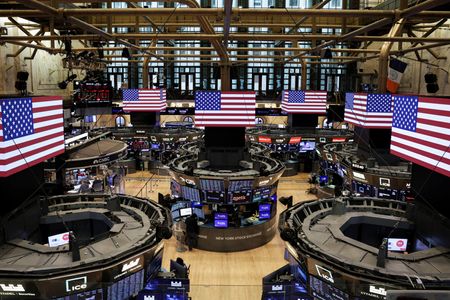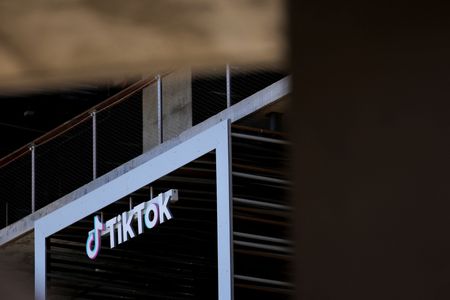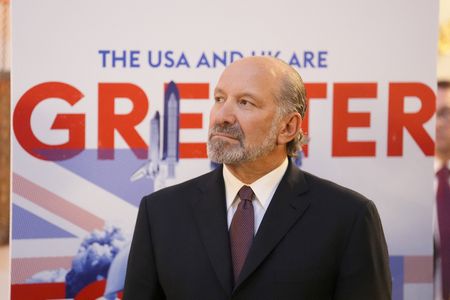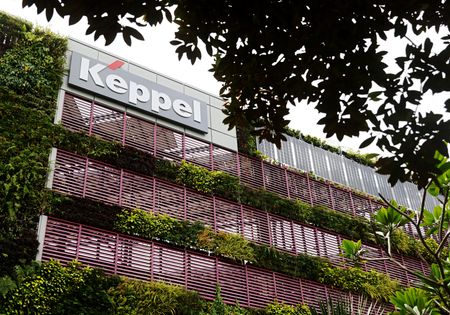By Jamie McGeever
ORLANDO, Florida (Reuters) -TRADING DAY
Making sense of the forces driving global markets
By Jamie McGeever, Markets Columnist
Wall Street rose to new highs on Monday, lifting global stocks to fresh peaks in the process as investors cheered the latest multi-billion-dollar agreement – one of the biggest – in the booming U.S. tech and artificial intelligence space.
More on that below. In my column today I look at how, by some measures, U.S. pension funds and households hold record amounts of equities. This is good news right now as stocks continue to outperform bonds. But can it last?
If you have more time to read, here are a few articles I recommend to help you make sense of what happened in markets today.
1. Miran defends low-rate view as colleagues caution onfurther cuts 2. Trump’s new visa policy inspires mostly sour responsefrom tech firms 3. Euro’s ‘global moment’ risks slipping away amidpolitical division 4. ECB can still frustrate euro surge with ‘contingencycut’: Mike Dolan 5. UK struggles to escape rule of Goodhart’s Law
Today’s Key Market Moves
* STOCKS: New peaks for MSCI World, S&P 500, Nasdaq, Dow.Argentina stocks +7.5%. * SHARES/SECTORS: Nvidia shares +4% to new high. U.S. techbiggest sector gainer, +1.7%. Communications services, consumerstaples both -0.9%. * FX: Dollar down broadly, euro among biggest G10 gainers+0.5%. Argentina’s peso bounces 4% on strong U.S. support forthe Milei government. * BONDS: Japanese Government Bond yields highest since2008 on hawkish BOJ signals Friday. U.S. yields up but no morethan 3 bps at front end, curve bear flattens slightly. * COMMODITIES: Gold notches another high, silver another14-year peak.
Today’s Talking Points:
* U.S. immigration
The Trump administration’s immigration crackdown is not just on the lower-skilled, lower-income end of the foreign worker spectrum at the country’s southern border – the new $100,000 fee for H-1B visas targets highly-skilled workers in specialty fields, mainly from India and China. Tech could be hit hardest.
Setting aside the politics, the macroeconomic impact of tighter immigration controls is negative. If GDP growth is the increase in labor supply plus the productivity growth of those extra workers, then less immigration equals less growth. And it looks like workers at both ends of the skills spectrum are in the administration’s sights.
* AI spend frenzy
The recent flurry of agreements and tie-ups between U.S. tech firms exploded on Monday with chipmaker Nvidia committing to invest up to $100 billion in OpenAI. It’s the latest example of companies pouring billions of dollars into securing and expanding capacity for powerful cloud computing required to develop and power complex AI technology.
Nvidia shares, the semiconductor and tech sectors, and Nasdaq and S&P 500 indices leaped to new highs. These are huge investments that raise the bar on future returns, potentially a headwind for markets in the months or years ahead. But not today.
* Politics and Palestine
It may not be a global market-mover, but it’s a moment in global political history. As global leaders converge on New York this week for the U.N. General Assembly, Britain, France and many other countries have recognized or are expected to formally recognize a Palestinian state.
Israel and the U.S. have rejected the notion out of hand, and U.S. President Donald Trump will address the U.N. on Tuesday. For investors, the most significant aspect of this may be how it affects U.S. relations with other major countries over the longer term.
U.S. savers go all in on ‘cult of equity’
U.S. pension funds and households have never held more equities as a share of their overall assets, by some measures, raising questions about whether the long-term shift towards stocks has run its course or whether investors have truly undergone a paradigm shift.
There are compelling arguments on both sides of that debate, but what’s not in dispute are the numbers.
The share of stocks in U.S. private sector defined contribution (DC) pension plans is now approaching 70%, while equities as a share of U.S. households’ financial assets is a record 45.4%.
John Higgins, chief markets economist at Capital Economics, notes that DC pension plans’ equity exposure is the highest in at least 75 years. This largely reflects the decades-long shift away from defined benefit (DB) schemes, where the risk of retirement savings lies with the employer, and toward DC plans, where employees assume more of the burden.
Broadly speaking, DB plans tend to invest more in bonds, especially long-dated ones, to match the funds’ longer-dated liabilities, while DC plans are equity-heavy, as individuals don’t have liabilities to match and so will be more likely to lean towards stocks offering higher returns – and higher risk.
In the 1950s, more than 90% of all U.S. pensions were DB plans, and less than 20 years ago the split was roughly 50-50. But now, almost 80% are DC plans.
In that sense, investors are in a brave new world – and it could be an increasingly risky one, given that DC plans are so highly exposed to Wall Street at a time when U.S. stock market valuations are looking stretched.
FLAGGING RISKS
From a returns perspective, overloading on stocks makes sense for long-term investors because equities usually outperform bonds, especially over the long run.
By some measures, that performance gap is widening, according to figures from Truist Advisory Services’ chief markets strategist Keith Lerner and his team.
As of August, the S&P 500’s trailing one-year annualized return was nearly 16%, compared with the Bloomberg aggregate bond index’s returns of just over 3%. The 12.7 percentage point gap is in the 68th percentile going back seven decades.
Moreover, the S&P 500’s returns advantage when measured on a rolling three- and five-year basis is in the 93rd and 95th percentiles, respectively.
How long can equities sustain that level of outperformance over bonds?
NOT SO ‘RISK-FREE’
The answer may be “a while”.
The near 40-year bull market in bonds appears to be over. Worries about inflation remain, the U.S. federal deficit and public debt are rising, and pension funds’ appetite for long-dated bonds may no longer be as voracious as it once was. In short, bonds don’t appear quite so ‘risk-free’ any more.
If stocks do continue to outperform over the long term, that’s obviously great news for future retirees with portfolios heavily weighted in that direction.
The danger, of course, is the stock market can fall sharply and very quickly, wiping out large swathes of savings for people just about to retire.
It’s also true that many people reduce their exposure to equities in favor of bonds as they near retirement, although that may become less prevalent in the context of a wider paradigm shift in how bonds are viewed.
There’s no indication that any dramatic equity market correction is on the horizon, though investors are conscious of how expensive stocks are getting. Still, they keep buying.
Although valuations are “unambiguously high by historical standards”, Deutsche Bank analysts just raised their year-end S&P 500 target to 7,000 from 6,550 and next year’s earnings per share forecast.
“High allocations to equities don’t necessarily mean another major correction in the stock market is imminent. Indeed, our forecast is that the S&P 500 will make further gains this year and next, as enthusiasm for AI continues to grow,” says Capital Economics’ Higgins. “But high allocations to equities may be flagging trouble ahead.”
That’s true. But as long as equities keep providing the returns and outperforming bonds, prospective retirees will keep ploughing their pension savings into them.
What could move markets tomorrow?
* September PMI releases start to roll in, including eurozone and U.S. * Bank of England chief economist Huw Pill speaks * ECB board member Claudia Buch speaks * U.S. current account (Q2) * U.S. Treasury auctions $69 billion of two-year notes * U.S. Fed officials scheduled to speak include Chair JeromePowell, Governor Michelle Bowman, and Atlanta Fed PresidentRaphael Bostic * Bank of Canada Governor Tiff Macklem speaks
Want to receive Trading Day in your inbox every weekday morning? Sign up for my newsletter here.
Opinions expressed are those of the author. They do not reflect the views of Reuters News, which, under the Trust Principles, is committed to integrity, independence, and freedom from bias.
(By Jamie McGeever; Editing by Nia Williams)











